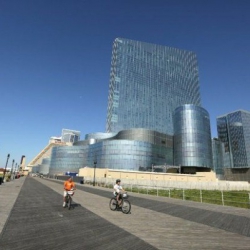In response to criticisms over his veto of a recent sports betting bill, New Jersey Governor Chris Christie has called an emergency gaming summit to be held in the next few weeks. The governor hopes to rescue Atlantic City’s land-based casino industry, which has seen 4 of its 12 operators close their doors this year.
The summit, which is set for September, will include New Jersey legislators, regulatory officials, casino operators, and trade union leaders. The governor hopes to brainstorm ideas for saving Atlantic City’s gaming industry, which is in freefall at the present. At its height in 2006, Atlantic City casinos collected $5.2 billion in revenues. Last year, they collected $2.7 billion–almost half as much.
Atlantic City’s Glory Days
When New Jersey legalized casino gambling in 1978, Atlantic City was the only casino gambling destination east of the Mississippi Rivers. Throughout the 1980’s, Atlantic City was one of the places to be, hosting big name heavyweight fights and operators boasting they might one day surpass Las Vegas. In 1989, only two states still allowed land-based casinos.
The 1987 Cabazon Ruling
Though most gaming operators did not know it at the time, the game already had changed by 1989. Everything changed in 1987, when the U.S. Supreme Court on the landmark case, California v. Cabazon Band of Mission Indians. In the ruling, the Supreme Court said the Cabazon Indians’ reservation was recognized as a sovereign country by a treaty signed by the United States federal government.
It might have taken a few years for the effects to be felt, but the ruling sent shock waves through the gambling industry. It meant that Native American tribes had the right to build casinos on their reservations. The Supreme Court stipulated that the Indian tribes had to come to a compact with the state in which their reservation was found, but it gave a legal loophole to lawmakers. Now politicians could tell their citizens they would not allow casino gambling on private land in the state, but still rake in tax revenues from licensing Indian tribes to build casinos on their territories.
Saturation of the Gaming Market
These days, 40 U.S. states host casino gambling, including all states on adjacent to New Jersey. Not all of the operations are tribal casinos. Leaders in some states began thinking, if they were going to have casino gambling within the confines of a state, they might as well create gaming enclaves for private interests. Therefore, placed like Tunica County, Mississippi came into being.
In the 1990’s and 2000’s, racetracks were beginning to face serious economic troubles. To prop up these failing businesses, numerous states voted to allow gaming machines and even table gaming at the racetracks–created the so-called “racinos”. With lottery gaming building up year-after-year and tribal casinos in most states, legislators and their constituencies told themselves that the horse was already out of the proverbial barn. Soon, most states had native casino-style gambling. When Philadelphia and New York passed measures approving such gaming, the market in the northeast became saturated. New Jersey now had to rely on gamblers in their own state, where once Atlantic City was a gambling destination for people throughout the eastern half of the United States.
Loss of Revenues and Credit Status
With the four closures, 8,000 of Atlantic City’s 40,000 casino employees have been thrown out of a job. New Jersey is still recovering from Hurricane Sandy. With the four closings in Atlantic City this year, the city’s taxable property values are down an alarming 17%. Moody reduced Atlantic City’s credit rating into the junk category earlier this year, making it harder for casino operators to get the funding they needed to keep their doors open. The Atlantic Club, the Showboat, and the Trump Plaza all either closed or announced they would close. Revel Casino, which only opened its doors in spring 2012, announced it would close in September.
Transitioning to Tourism Trade
The governor’s plan seems to be transitioning Atlantic City from a gambling economy to one based more on tourism. The strategy has worked for Las Vegas to some extent. Instead of creating casinos for hardcore gamblers, the Las Vegas experience is now based around gambling enhanced with shopping, dining, clubbing, and shows. Many people believe the only way to make Atlantic City viable is to make the city into a place non-gamblers want to visit.
In announcing the summit, Chris Christie’s office released the following statement: “Important signs are evident of the progress taking hold in the non-gaming development and economic activity we are seeing in Atlantic City, including businesses opening, attractions being added, and key non-gaming revenue streams rising.”
Public Policy or Public Relations?
With Chris Christie’s veto of a sports gambling bill over the weekend, many wonder how committed the governor is to the New Jersey gambling industry. Christie’s decision to veto seemed more motivated by concern of how it would look defying federal law while running for federal office, because Gov. Christie is planning a run for the U.S. presidential nomination in 2016. Instead of making decisions which were best for New Jersey, he is accused of making decisions best for his presidential aspirations.
Refusing to defy the U.S. Supreme Court and established federal law can be defended on its own merits, but people can still wonder if new policies will be discussed at the summit, or whether it’s a kind of public relations damage control when polls show that New Jersey’s electorate believed Christie should have kept fighting. Remarking on the recent veto, Democratic State Senator Ray Lesniak said to the press that Christie, had “stuck a dagger in the heart of Atlantic City and our ailing horse racing industry.”

